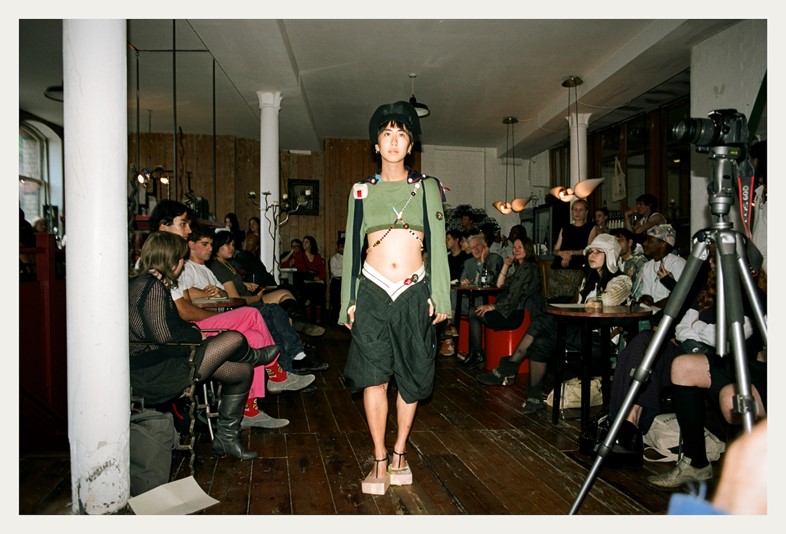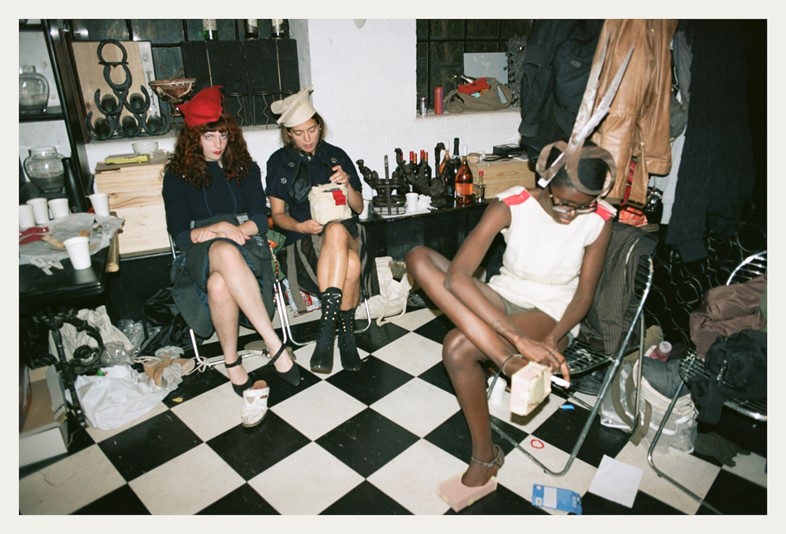Rewrite
Presented to an intimate audience in Borough, Ellen Poppy Hill’s sentimental debut catwalk show featured lovingly upcycled unique pieces. “It’s not perfect – that’s the point,” she explains
- Who is it? Ellen Poppy Hill is a fashion designer and Central Saint Martins graduate
- Why do I want it? Lovingly crafted, upcycled clothes imbued with meaning through metaphorical embellishments and intelligent, literary details
- Where can I find it? The basement at Dover Street Market, for a short time only
Who is it? “I’m not as angry anymore,” Ellen Poppy Hill says over Zoom from her studio before cracking a pensive smile, looking off at the busy rail holding her new collection. “I guess now I feel a little more cheeky.” Last year, Hill graduated from Central Saint Martins’ MA fashion design course, where she presented a lovingly scruffy final collection of intricately upcycled pieces, cut and embellished with details inspired by chopped-up and reassembled proverbs. It was clever and unique, and received positive feedback, but the post-graduation jitters led her towards self-doubt, and she felt a little pissed off at the system as a whole. “People need to believe you, and they need to understand an image. They need to find it addressable,” she says, “so I never felt there was space for me.”
Sure, her designs aren’t fashion fashion. Now 26 years old, Hill came of age when Gareth Pugh and Alexander McQueen were making Lady Gaga look like a latex-clad alien, and Karl Lagerfeld was sending models down a purpose-built supermarket in the Grand Palais. On the other hand, Hill’s references came from library books and her own drawings on paper. Her mother is a set designer and her father is an actor, so she’d grown up surrounded by books on costumes and plays. She later worked in second-hand clothes shops and fell in love with the stories behind old garments, where each unsightly stain had its own visual language that spoke to a life well lived.
“I didn’t know what I was going to be after graduating. I had to figure it out while working in a bar to make some money. I was coming to the studio from the bar and making one piece of clothing a day, it was like having a second life,” she says. Many of those pieces ended up as offerings at Nasir Mazhar’s nomadic fashion boutique Fantastic Toiles, a bi-monthly marketplace that dresses the teems of ragtag creatives populating east London’s indie pubs. “I had a personal life for the first time,” she remembers of her newfound way of working. “I wasn’t stuck in a weird fashion cycle from season to season. But then, clearly, I got a bug about that too, and I needed to fix it.”
Over a drink at the pub at the beginning of this year, that itch for change was scratched when her close friend, the stylist Lulu Bullock, offered her a helping hand in creating a collection that could debut during fashion week. “Suddenly, all my friends came in and offered their help too. My old teachers called me saying, ‘I saw the Vivienne Westwood exhibition and I thought of you, do you want me to do some prints for you?’ My friend Coco [Kwu] came in to do the casting. My brother made a publication with me. Quickly, I had all of these people who wanted to be there for me. It was beautiful, and it’s been amazing. It built my confidence a lot.”
Why do I want it? Hill‘s off-schedule show came together on the Monday evening of London Fashion Week in Lant Street Wines, the cosy, rustic bar-slash-wine-merchants decked out in interior designer Jermaine Gallacher’s irreverent, tongue-in-cheek clobber. Guests crammed into every nook and corner – many stood, while some sat on the floor – as models made their procession around the room’s central staircase. Titled Constant State of Repair, the collection was a sentimental ode to Hill‘s own relationship with broken clothes. “I never mend anything that I own myself. Every single item of clothing in my room is destroyed, dirty, broken and in a state of disrepair,” she says. “I wanted to present that as a vehicle for humour.”
All the elements of clothing repair – like tape, pins, zippers and holes – were glorified and made larger than life in the collection. The opening look, a bolero jacket in the yellowing colour of an unscrubbed bathtub, had gigantic zips with teeth tracing down the sleeves. Moth motifs appeared as embellishments, nibbling away at her cherished one-of-one couture pieces. Elsewhere, that same unlovely yellow mimicked masking tape holding together a bias-cut gown – that ‘tape’ was actually fabric sourced by friend and mad hatter Madeline Thornalley, who lovingly made the collection’s millinery (Thornalley closed the show in a floaty, semi-sheer asymmetrical dress).
“I’ve always been so against clothes that make women look like objects. I’ve hated men making couture and being like, ‘She’s a zip!’ or ‘She’s a bow!’ I find it aggressive. So this is also a comment on that idea, because this is fake. It’s trompe-l’œil fixing, and it’s owning it,” she says. “I’m bad at repairing my things, but it’s because I’m still not fixed. I’ll fix it all when I’m fixed.”
Following stints working in second-hand clothing shops, Hill landed a job on the shop floor in Dover Street Market during her university years; recently, the team there serendipitously got back in touch. “They asked what I was up to. I told them I was making a collection, and they said they’d sell it.” Now, each perfectly scruffy piece from Constant State of Repair populates a special installation in the basement of the cult London store. “Quite cleverly – but also in an insane way – I’ve made most of this collection out of wool, which I’m allergic to. I could never keep it anyway, it’s all too itchy.”
With her deteriorating wardrobe now a badge of pride – a striking disconnected from the slick and shiny coolness of the London fashion scene – Hill is crafting clothes that continue to have life when bundled and heaped over the back of your bedroom chair. These are clothes that are made to be loved, even when they’re ripped and tattered. “I know I’m not meant to sell my work while saying it’s not perfect. I really loved making it, and while I am sorry if it’s not perfect, that’s the point.”
Where can I find it? Ellen Poppy Hill’s debut collection is currently being sold on the basement floor of Dover Street Market in London.
in HTML format, including tags, to make it appealing and easy to read for Japanese-speaking readers aged 20 to 40 interested in fashion. Organize the content with appropriate headings and subheadings (h1, h2, h3, h4, h5, h6), translating all text, including headings, into Japanese. Retain any existing
tags from
Presented to an intimate audience in Borough, Ellen Poppy Hill’s sentimental debut catwalk show featured lovingly upcycled unique pieces. “It’s not perfect – that’s the point,” she explains
- Who is it? Ellen Poppy Hill is a fashion designer and Central Saint Martins graduate
- Why do I want it? Lovingly crafted, upcycled clothes imbued with meaning through metaphorical embellishments and intelligent, literary details
- Where can I find it? The basement at Dover Street Market, for a short time only
Who is it? “I’m not as angry anymore,” Ellen Poppy Hill says over Zoom from her studio before cracking a pensive smile, looking off at the busy rail holding her new collection. “I guess now I feel a little more cheeky.” Last year, Hill graduated from Central Saint Martins’ MA fashion design course, where she presented a lovingly scruffy final collection of intricately upcycled pieces, cut and embellished with details inspired by chopped-up and reassembled proverbs. It was clever and unique, and received positive feedback, but the post-graduation jitters led her towards self-doubt, and she felt a little pissed off at the system as a whole. “People need to believe you, and they need to understand an image. They need to find it addressable,” she says, “so I never felt there was space for me.”
Sure, her designs aren’t fashion fashion. Now 26 years old, Hill came of age when Gareth Pugh and Alexander McQueen were making Lady Gaga look like a latex-clad alien, and Karl Lagerfeld was sending models down a purpose-built supermarket in the Grand Palais. On the other hand, Hill’s references came from library books and her own drawings on paper. Her mother is a set designer and her father is an actor, so she’d grown up surrounded by books on costumes and plays. She later worked in second-hand clothes shops and fell in love with the stories behind old garments, where each unsightly stain had its own visual language that spoke to a life well lived.
“I didn’t know what I was going to be after graduating. I had to figure it out while working in a bar to make some money. I was coming to the studio from the bar and making one piece of clothing a day, it was like having a second life,” she says. Many of those pieces ended up as offerings at Nasir Mazhar’s nomadic fashion boutique Fantastic Toiles, a bi-monthly marketplace that dresses the teems of ragtag creatives populating east London’s indie pubs. “I had a personal life for the first time,” she remembers of her newfound way of working. “I wasn’t stuck in a weird fashion cycle from season to season. But then, clearly, I got a bug about that too, and I needed to fix it.”
Over a drink at the pub at the beginning of this year, that itch for change was scratched when her close friend, the stylist Lulu Bullock, offered her a helping hand in creating a collection that could debut during fashion week. “Suddenly, all my friends came in and offered their help too. My old teachers called me saying, ‘I saw the Vivienne Westwood exhibition and I thought of you, do you want me to do some prints for you?’ My friend Coco [Kwu] came in to do the casting. My brother made a publication with me. Quickly, I had all of these people who wanted to be there for me. It was beautiful, and it’s been amazing. It built my confidence a lot.”
Why do I want it? Hill‘s off-schedule show came together on the Monday evening of London Fashion Week in Lant Street Wines, the cosy, rustic bar-slash-wine-merchants decked out in interior designer Jermaine Gallacher’s irreverent, tongue-in-cheek clobber. Guests crammed into every nook and corner – many stood, while some sat on the floor – as models made their procession around the room’s central staircase. Titled Constant State of Repair, the collection was a sentimental ode to Hill‘s own relationship with broken clothes. “I never mend anything that I own myself. Every single item of clothing in my room is destroyed, dirty, broken and in a state of disrepair,” she says. “I wanted to present that as a vehicle for humour.”
All the elements of clothing repair – like tape, pins, zippers and holes – were glorified and made larger than life in the collection. The opening look, a bolero jacket in the yellowing colour of an unscrubbed bathtub, had gigantic zips with teeth tracing down the sleeves. Moth motifs appeared as embellishments, nibbling away at her cherished one-of-one couture pieces. Elsewhere, that same unlovely yellow mimicked masking tape holding together a bias-cut gown – that ‘tape’ was actually fabric sourced by friend and mad hatter Madeline Thornalley, who lovingly made the collection’s millinery (Thornalley closed the show in a floaty, semi-sheer asymmetrical dress).
“I’ve always been so against clothes that make women look like objects. I’ve hated men making couture and being like, ‘She’s a zip!’ or ‘She’s a bow!’ I find it aggressive. So this is also a comment on that idea, because this is fake. It’s trompe-l’œil fixing, and it’s owning it,” she says. “I’m bad at repairing my things, but it’s because I’m still not fixed. I’ll fix it all when I’m fixed.”
Following stints working in second-hand clothing shops, Hill landed a job on the shop floor in Dover Street Market during her university years; recently, the team there serendipitously got back in touch. “They asked what I was up to. I told them I was making a collection, and they said they’d sell it.” Now, each perfectly scruffy piece from Constant State of Repair populates a special installation in the basement of the cult London store. “Quite cleverly – but also in an insane way – I’ve made most of this collection out of wool, which I’m allergic to. I could never keep it anyway, it’s all too itchy.”
With her deteriorating wardrobe now a badge of pride – a striking disconnected from the slick and shiny coolness of the London fashion scene – Hill is crafting clothes that continue to have life when bundled and heaped over the back of your bedroom chair. These are clothes that are made to be loved, even when they’re ripped and tattered. “I know I’m not meant to sell my work while saying it’s not perfect. I really loved making it, and while I am sorry if it’s not perfect, that’s the point.”
Where can I find it? Ellen Poppy Hill’s debut collection is currently being sold on the basement floor of Dover Street Market in London.
and integrate them seamlessly into the new content without adding new tags. Ensure the new content is fashion-related, written entirely in Japanese, and approximately 1500 words. Conclude with a “結論” section and a well-formatted “よくある質問” section. Avoid including an introduction or a note explaining the process.






